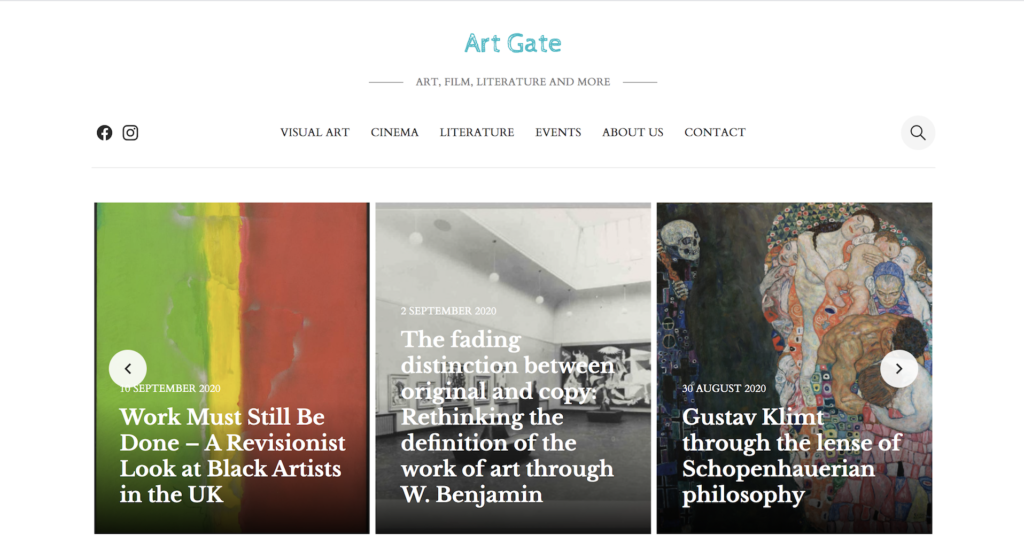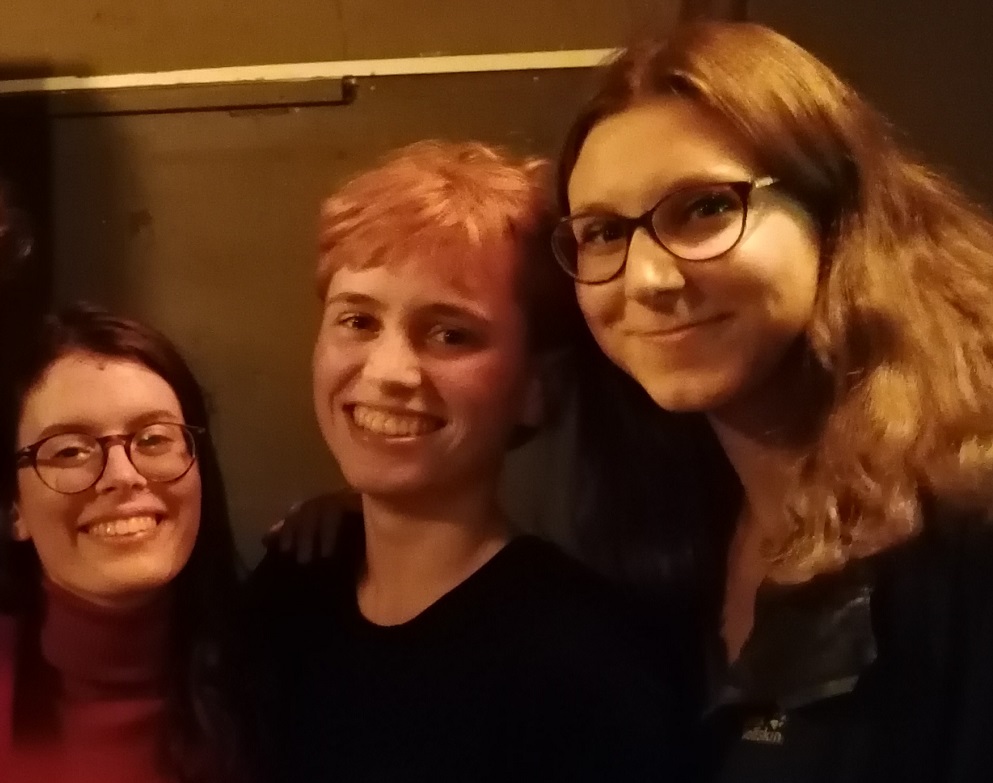During the lockdown of Spring 2020, three History of Art students at the University of Glasgow – Belen De Bacco, Bianca Callegaro and Luna Silvestri – used this unexpected new-found time to establish Art Gate, a cultural blog and online community with the aim of making the arts more accessible. In this post Belen discusses the project’s background, the value of art during lockdown, and the positive legacy of a difficult time.
Lockdown started in Italy on 10 March and lasted until 13 April and brought with it, along with its terrible anxieties, something that cannot be bought: time.
During this period I kept in contact with two other History of Art students, the three of us coming from different cities across Italy. We felt the need to create something that could keep us focused and function as a distraction from the horror that was taking place on our doorsteps. Our passion for art and the desire always to learn new things about it pushed us to think proactively. Being imposed to stay at home may have been tortuous but, in truth, we learned that whatever the situation the key is to take advantage of what it may offer you. Lockdown offered us time, and that led us to take this unique opportunity to create something positive and engaging, in contrast to the dramatic climate that was surrounding Italy and, shortly after, the whole world.
As members of the Glasgow University Art Appreciation Society, we initially published short posts on the society’s social media platforms. We began on the topic of Raphael, to honour this great artist who died on 6 April 1520 in Rome, exactly 500 years ago. As we came to realise that these social media plaftorms were not best suited for creative writing and, noticing that our posts were starting to be successful, we decided it was time to take the next step: that’s when the Art Gate blog began.

Thinking about our experience in the Art Appreciation Society where (pre-Covid) we would host weekly cultural events, gathering together students of different academic disciplines, we decided to transpose these initiatives online. We wanted to create a free, virtual space for writing reflections about art, supporting new artists, narrating the experiences of exploring art museums, writing film reviews and so much more. Our aim is to stay connected and create a positive online environment by encouraging anyone interested in art to collaborate with us and express their viewpoint on a particular topic, artist or cultural event.
A Positive Space
For me, the need to create a positive impact – specifically online – comes from the fact that we are constantly bombarded with news, which often cause distress and anxiety. What we wanted to build was a platform that detached from this net of fast information by offering new and original content related to arts and culture. Sadly, this is often a topic classified as less important, as we can see from the severe consequences that this sector has encountered during the pandemic. Museums teeter on the edge, cultural events are cancelled, community cultural practices are suspended, artists struggle. The impact of Covid-19 in the heritage sector is dramatic and it greatly affected the fundamental right of access to culture and the protection of a diversity of cultural expressions. Conversely, what we saw during lockdown was that people sought refuge in culture, showing the underestimated importance of art. A world without culture is a world without a future and we are the ones responsible for preserving this future. We wanted to react to this crisis and adapt to the online environment in which the cultural sector shifted in order to keep in touch with the public, so as to re-establish the connection between our heritage and the general audience.
Many believe that art is an elitist subject that can be understood and enjoyed exclusively by experts. Art Gate’s main mission is to discredit this popular belief and create a new way to drive a larger part of the public towards art, especially students. The young generations have the responsibility of making a change, protecting and enhancing the cultural heritage which belongs to everyone. But in order to protect it we have to learn to appreciate it. We are not looking for cryptic academic essays; instead, we focus on short, clear articles that can be read by an audience that does not necessarily hold any prior or specific knowledge of art. We also keep up to date with the latest cultural initiatives around the world, both physical and online, making the most of our online presence to promote events organised by different institutions.

Art Gate founders: Biana, Luna and Belen 
Art Gate logo
A Collaborative Platform
Our aim is to promote culture and art in all its forms, ranging from visual art to cinema and literature, and engage a wider group of people with art. Our key goal is to make art available to everyone and easy to access. As such we decided to open the blog to contributions. One of the most powerful effects of art is that it creates a space of dialogue and we want to protect this space by offering access to it to everyone. We propose weekly topics on the Art Gate blog community Facebook page, a group established to encourage the contributors to dialogue, creating a sense of community and an opportunity for networking. We receive and edit pitches from writers, and allow direct access to our WordPress page, giving writers the freedom to choose the display on the page and position the images as they prefer. We as managers are then responsible for the promotion on Instagram, Facebook, Twitter and LinkedIn.
We are very happy with the success of the blog to date. Only last month we registered 600 viewers, noticing an increase of 350 visitors since May. We have received contributions from seven new authors, reaching 50 publications in only five months. We have plenty of ideas for new topics and collaborations, including The Hunterian Museum and qmunicate magazine. We have also been invited to participate in the webinar ‘Lockdown Legacy: The Digital Future of the Art and Cultural Heritage World’ organised by the Scottish Society for Art History and taking place on 7 November 2020. We really hope to see many more and diverse contributions on Art Gate. Let’s protect this space for free dialogue together.
Browse Art Gate at artgateblog.altervista.org and join the community on Facebook, Instagram [@gu_art_as] and Twitter [@GUartAS]
Interested in Contributing? Contact artgateblog@gmail.com for details.
Belen De Bacco is a third-year History of Art and English Literature student at the University of Glasgow. She is one of the co-founders of Art Gate blog and secretary of the Art Appreciation Society at the University of Glasgow. She is currently part of the MuSE programme at the Hunterian Museum.

